Key takeaways:
- Using a password manager enhances security by generating and storing strong, unique passwords, simplifying password management.
- Implementing two-factor authentication (2FA) adds an essential layer of protection, reducing the risk of unauthorized access to accounts.
- Regularly updating passwords and using unique passwords for different accounts significantly minimizes vulnerabilities and potential breaches.
- Being cautious and trusting your instincts when faced with suspicious login attempts can prevent falling victim to phishing attacks.
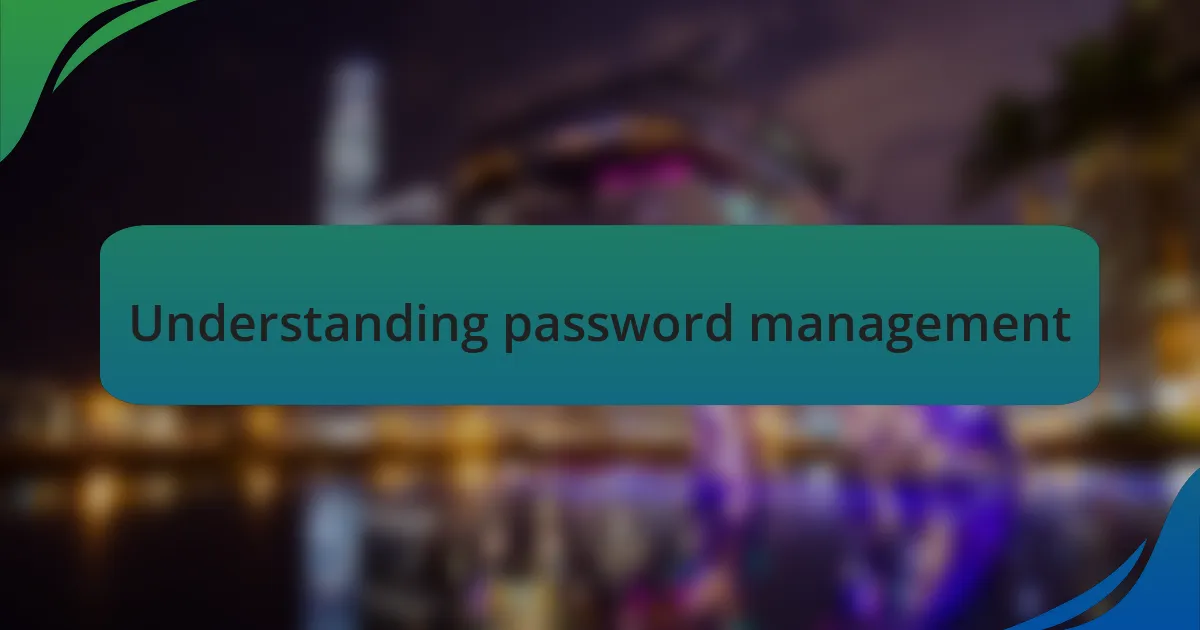
Understanding password management
Managing passwords effectively is crucial in today’s digital age, where even the smallest oversight can lead to significant security breaches. I remember the first time I faced the consequences of poor password management. My account was compromised simply because I reused a password from an old service. It was a wake-up call that made me realize the importance of unique, strong passwords for each account.
One effective strategy I’ve found is using a password manager. This tool not only stores my passwords securely but also generates complex passwords that I would never come up with on my own. Have you ever tried to create a password that meets all the security criteria? It can be overwhelming! A password manager alleviates that burden while enhancing my online safety.
Additionally, an important detail I always emphasize is the necessity of two-factor authentication (2FA). Adding that extra layer of security transforms the way I feel about online safety. I ask myself, “Isn’t it worth a few extra seconds to secure my accounts?” Absolutely. I’ve experienced firsthand the peace of mind that comes from knowing my information is safer, even if my password is compromised.
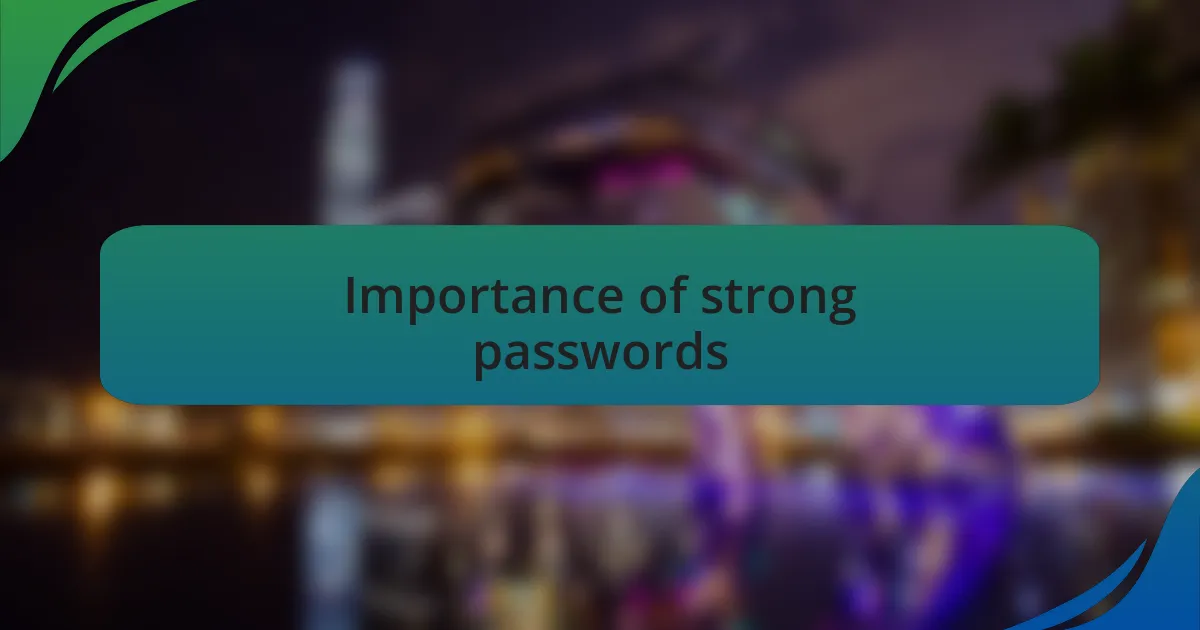
Importance of strong passwords
It’s essential to grasp why strong passwords are non-negotiable in our digital lives. After a friend’s account was hacked due to a weak password, I realized how vulnerable we all can be. Strong passwords act as the first line of defense against unauthorized access, protecting not only personal data but also sensitive business information that could compromise an entire organization.
In my experience, the stronger the password, the less likely it is to be guessed or cracked. I recall a moment when I created a particularly complex password—mixing numbers, symbols, and random words. While it felt daunting to remember, the thought of what I stood to lose made it worth the effort. Have you ever considered what’s at stake? A single weak password could endanger years of work and customer trust.
Moreover, the psychological aspect of using strong passwords cannot be overlooked. I often feel a sense of empowerment knowing I’m taking proactive steps to shield myself from potential threats. The comfort that comes from knowing my accounts are fortified against hackers is invaluable. Wouldn’t you agree that peace of mind is priceless when navigating the online world?
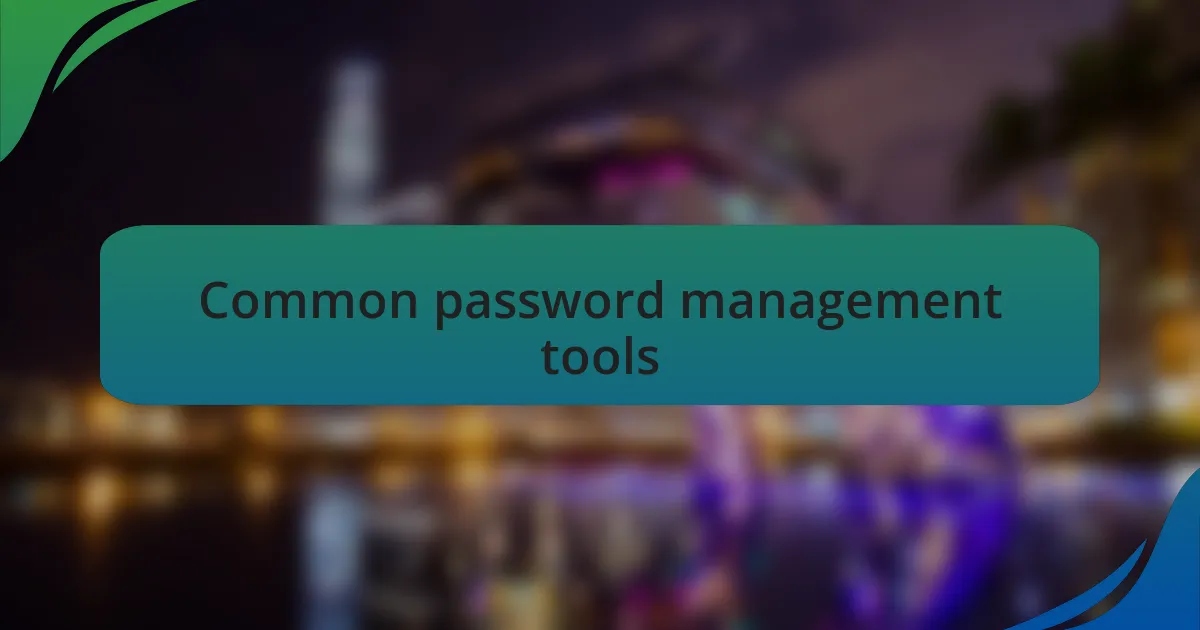
Common password management tools
When it comes to managing passwords, various tools can significantly streamline the process. I often rely on password managers like LastPass and 1Password, which offer encrypted vaults to store my passwords securely. Having everything in one place not only saves me time but also reduces the mental load of remembering each password—it’s like having a personal security guard for my digital life.
Interestingly, I’ve found that these tools also have built-in generators that create strong, random passwords for me. When I first tried this feature, I was amazed at how effortless they made it to maintain security—no more struggling to come up with a unique password that meets complexity requirements. Does it feel as if the convenience of these tools sometimes outweighs our inclination to remember passwords? For me, the trade-off is worth it, knowing my security is enhanced.
Additionally, tools like Dashlane provide features that alert me if any of my passwords have been compromised. I’ll never forget the moment I received an alert about a breach involving one of my accounts; it felt like a wake-up call. That incident prompted me to revamp my password strategy entirely. Have you ever considered how these proactive features can be a game changer for your security, giving you a sense of control in an unpredictable digital landscape?
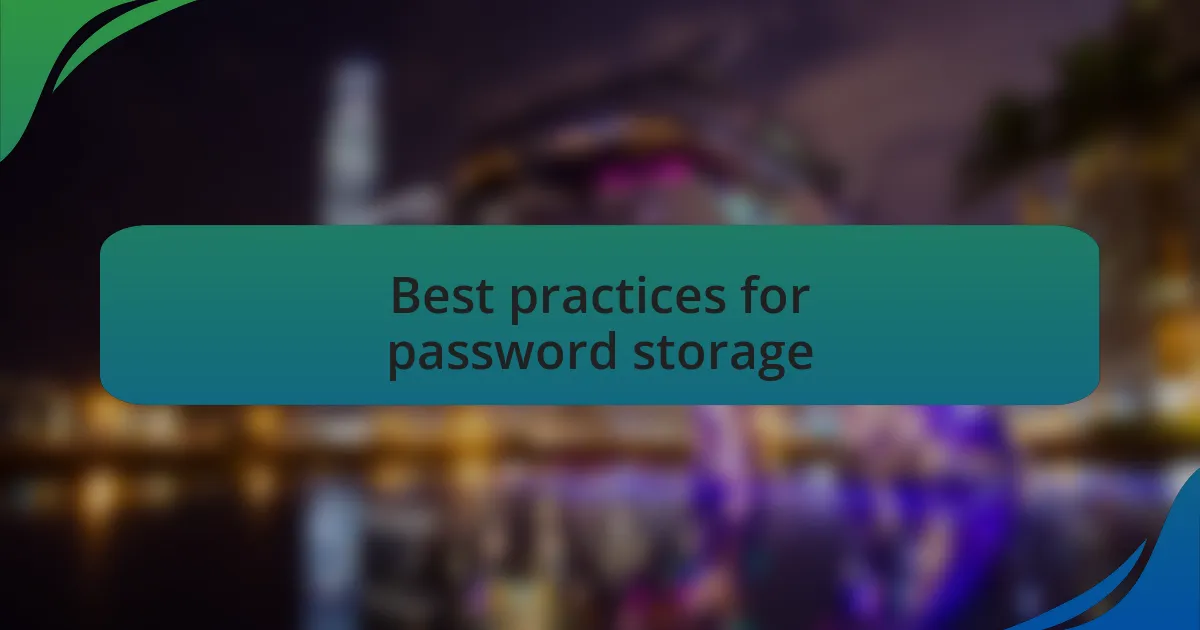
Best practices for password storage
Storing passwords securely is paramount, and I’ve learned that encryption is non-negotiable. When I first started using a password manager, I was surprised by the level of security they provided. Not only do they encrypt my passwords, but they also keep them safe from prying eyes—both digital and physical. Have you ever thought about how vulnerable unprotected passwords can be?
I also advocate for using unique passwords for every account. I remember a friend of mine who reused the same password everywhere; unfortunately, it led to a breach that compromised several of her accounts. Since then, I’ve been diligent in creating distinct passwords for different sites. It might seem tedious at first, but I assure you, it’s a small effort that can save a world of trouble later on. Isn’t it comforting to know that a few extra minutes spent on password creation can significantly bolster your security?
Lastly, consider regularly updating your passwords. I set a reminder on my calendar every few months to refresh my passwords. The process may be a bit annoying, but it gives me peace of mind, knowing that I’m staying one step ahead of potential threats. Have you thought about how often you really assess your password strength? Regular audits can catch vulnerabilities you might not even be aware of.
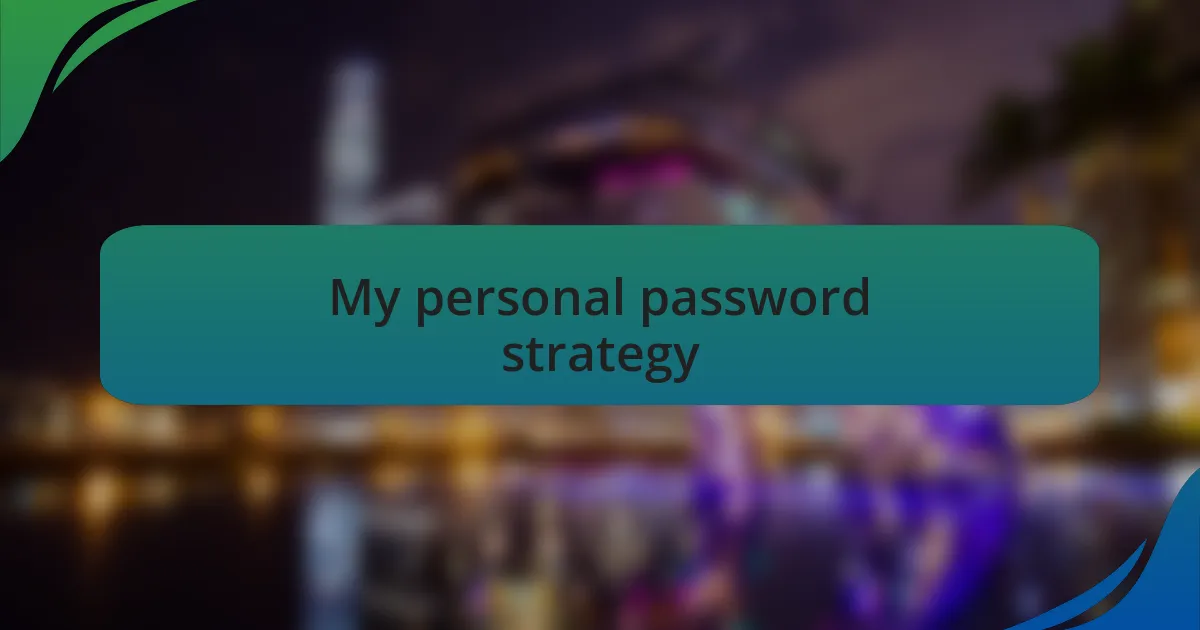
My personal password strategy
One key aspect of my personal password strategy is using a reliable password manager that not only helps in generating complex passwords but also organizes them in a user-friendly way. I still remember the frustration of forgetting my passwords and scrambling to reset them. With the password manager, that stress is a thing of the past. It’s like having a digital vault, which makes managing my passwords feel effortless, and that’s a huge relief.
I also take the time to think about the type of passwords I create. Instead of random strings of characters, I often use a combination of phrases that resonate with me, interspersed with numbers and symbols. For example, I might think of a favorite quote and modify it. This approach not only makes my passwords easier to remember but also adds a personal touch that feels secure and significant. Have you ever considered how much easier it can be when your passwords reflect a bit of who you are?
Lastly, I practice a bit of mindfulness when it comes to password security. When I set a new password, I pause for a moment to visualize how it fits into my overall digital safety net. This simple reflection allows me to acknowledge the importance of each password and motivates me to avoid shortcuts. Imagine treating your passwords like keys to the most important areas of your life; it changes how you perceive their value.

Lessons learned from my experience
Reflecting on my journey with password management, I’ve realized the importance of regular updates. Early on, I fell into the habit of creating a password and then sticking with it for far too long. One day, I logged into my email and noticed odd activity; I felt a rush of panic. That moment taught me that evolving my passwords regularly is like keeping my digital home secure from intruders. Have you ever thought about how often you should really change your passwords?
Another lesson was discovering how crucial it is to enable two-factor authentication (2FA). When I first set it up, I was hesitant, thinking it might complicate the login process. However, the added layer of security proved invaluable when I received an alert about an attempted login from an unknown device. It was like having an alarm system for my accounts. If you’re not using 2FA, why not give it a try?
Finally, I’ve learned that sharing passwords can be a slippery slope. In the past, when collaborating on projects, I would hastily share my passwords. Once, a team member accidentally changed my account settings, leading to a cascade of issues. Since then, I’ve shifted to using shared access features when available, which protect my accounts while still allowing collaboration. This shift made me realize the importance of balancing trust and security. Have you experienced any pitfalls with password sharing?
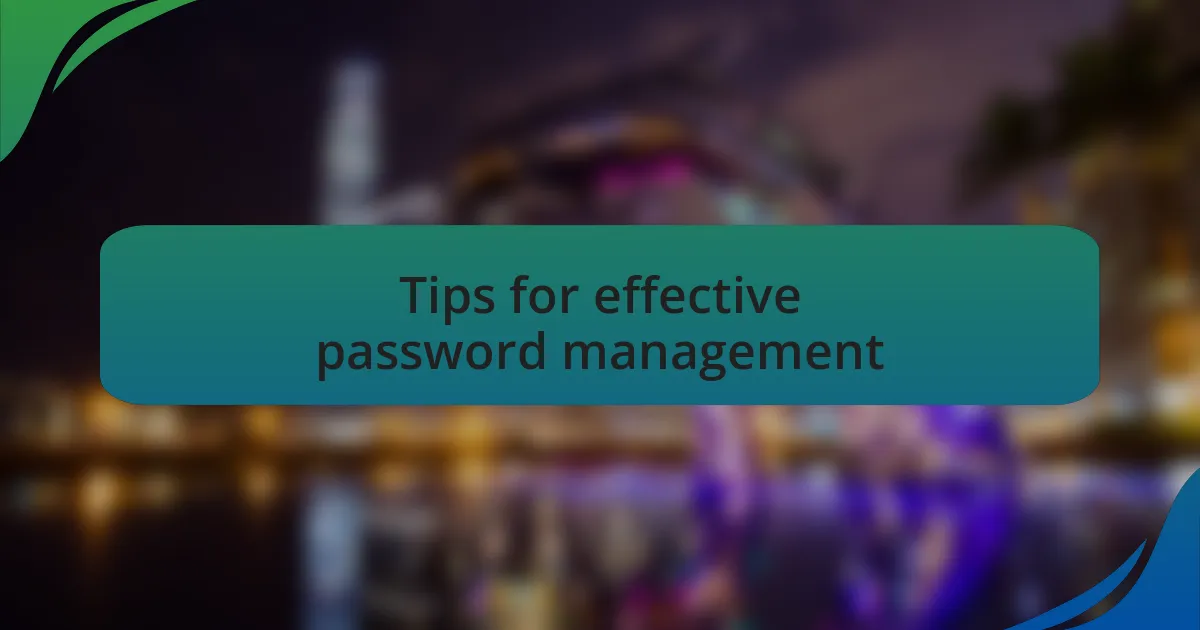
Tips for effective password management
To streamline my password management, I’ve found that using a password manager can be a game-changer. At first, I was skeptical about storing my passwords in a single app, fearing a potential breach. But when I finally took the plunge, I discovered that it not only saved me time but also boosted my security by generating complex passwords I would never have created on my own. I still remember the sense of relief when, instead of struggling to recall each password, I simply accessed everything securely with one master password.
Another tip I’ve picked up along the way is the importance of unique passwords for different accounts. It was difficult for me to break the habit of reusing passwords for convenience. But after receiving yet another warning about a data breach that exposed common passwords, it hit home: if one account gets compromised, all the others are at risk. Now, I focus on creating distinct passwords for each site, which feels like an essential step to safeguarding my digital identity. What about you? Have you ever reused a password and faced similar consequences?
Lastly, I’ve learned to trust my instincts when it comes to suspicious login attempts. Recently, I received an email that looked remarkably convincing, prompting me to click on a link. Fortunately, something felt off—I paused and recognized it as a phishing attempt. This experience solidified my belief in always questioning unexpected prompts for my passwords. It’s remarkable how a little caution can lead to peace of mind in a world filled with online threats. Have you had similar moments where your intuition saved you from a potential security lapse?